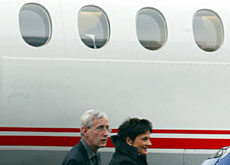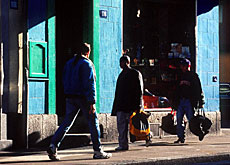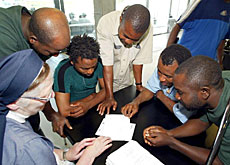Asylum deals provoke storm of criticism

Switzerland has come under fire over repatriation agreements with Senegal and Nigeria, signed this week by the justice minister, Ruth Metzler.
Human rights groups criticised in particular the treaty with Senegal which allows Switzerland to deport West African asylum seekers to holding centres in that country.
The deal is the first of its kind with an African state, and has been hailed by Jean-Daniel Gerber, head of Switzerland’s Federal Office for Refugees, as a great success.
Under the agreement, West African asylum seekers who refuse to declare their identities will be deported directly to Senegal, if their applications are rejected. Once there officials will establish their identity and return them to their countries of origin.
Gerber accompanied Metzler on the trip to Africa, from where he told swissinfo that the new agreements would bring fair rules to a process which is largely unregulated.
“At the moment when claims for asylum are rejected, the people concerned are simply kicked out, to use a blunt term,” said Gerber.
Humane
“Under the new agreement, the process will be much more humane. We will have contact with the country of origin or of the transit country, and we will be able to ensure that these people are treated in a dignified manner.”
The Swiss government also claims the agreement will be more efficient, mainly because many West African states have no embassy in Switzerland, while all of them are represented in the Senegalese capital, Dakar.
Once the asylum seekers arrive in Senegal, Swiss officials will have 72 hours to determine their identities. If they cannot do so, the asylum seekers will be brought back to Switzerland.
Criticism
Some African non-governmental organisations reacted angrily to the agreement, saying it was an insult to West Africans, and nothing more than ploy to use Senegal as a ‘dumping ground’ for asylum seekers.
Amnesty International Switzerland and the Swiss Refugee Council expressed concerns about the well-being of asylum seekers once they were in Senegal.
“In Switzerland, there are various bodies which make sure asylum seekers’ rights are respected,” said Jürg Keller of Amnesty. “Who will protect them in Senegal?”
The two groups also said much of the detail of the agreement was vague, and open to misinterpretation.
For his part, Gerber said he was “astonished at the position of the NGOs. The agreements are based on the Geneva Convention on Refugees, and on Swiss law. As a matter fact I think it’s preferable that we apply these agreements rather than acting unilaterally.”
The United Nations Refugee Agency, UNHCR, has cautiously welcomed the Swiss asylum deal. Spokesman Rupert Colville said as long as no genuine refugees were deported, the agreement could be one solution to the problem of abuse of the asylum system.
“Providing they really are rejected asylum seekers and have been through the procedure properly we don’t really have any objection,” Colville told swissinfo.
Credibility
“In fact we think people who have been rejected should be sent back. That is rather important for the credibility of the asylum system.”
Nevertheless Colville said the accord could prove difficult to carry out. “It certainly sounds like a complicated and unusual arrangement. And it remains to be seen how it will work out.”
However, Colville said the UNHCR was reassured by the fact that Swiss officials would remain in charge of the asylum seekers while they were in Senegal.
“There are some safeguards under the agreement,” he said. “The fact that Switzerland is still responsible is a good thing.”
Zero immigration not possible
However, the UNHCR, together with other refugee organisations, remains concerned that young Africans who want to come to Western Europe are left with very little option other than to claim asylum.
“We have tried to point out that if you close all immigration doors then inevitably you’ll get people in the asylum process who shouldn’t be there,” said Colville.
“That then tarnishes the asylum procedure and makes it more difficult for genuine refugees to be treated sympathetically, and even to get in at all.
“Zero immigration simply doesn’t work, it just fuels these very destructive people smuggling networks.”
Tone of debate is worrying
The UNHCR is also concerned about the negative tone of the debate on asylum, particularly over the course of the past year.
“It varies from country to country,” said Colville. “But it became such a hot issue last year. We saw politicians and some elements of the media jumping on this bandwagon in really quite a nasty and opportunist way.”
Here Colville has the wholehearted support of Jean-Daniel Gerber. “It’s a great pity that here in Europe, and in Switzerland in particular, we spend $1 billion a year on refugees, and we criticise our actions instead of being proud that we are investing money in poor people who have had to flee their countries,” he said.
“And we seem to have forgotten how beneficial migration is,” Gerber continued. “There’s no immigration period in Switzerland, which, when looked at retrospectively, has proved to be wrong or damaging.”
Nevertheless, Colville fears that the climate of opinion towards immigrants and asylum seekers is now so negative that the cases of some genuine refugees may well be harmed.
“The whole attitude towards refugees has changed, in the Cold War they were regarded very sympathetically, but now there seems to be a belief that all asylum seekers are bogus and are only coming for a better life.”
“For genuine refugees, who have had to flee their countries to save their lives, that kind of lack of sympathy can be lethal.”
Justice Minister Metzler has signed repatriation deals with Nigeria and Senegal.
The deal with Senegal allows Switzerland to directly deport West African asylum seekers who refuse to declare their identities.
Last year the Swiss rejected an initiative to tighten the asylum laws.

In compliance with the JTI standards
More: SWI swissinfo.ch certified by the Journalism Trust Initiative













You can find an overview of ongoing debates with our journalists here . Please join us!
If you want to start a conversation about a topic raised in this article or want to report factual errors, email us at english@swissinfo.ch.